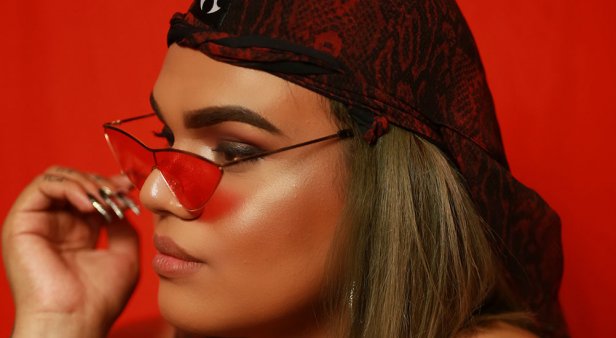To start, we’d love to know what the first hip-hop song to truly captivate you was!
That would have to be Lil Kim’s ‘Queen Bitch’. It was one of the first rap songs done by a woman of colour that I heard that interested me and really touched on female empowerment, our stories, our experiences and was done in a way that was really confident and unapologetic.
What was it about hip-hop that resonated with you as a personal creative outlet?
Hip-hop for me has never been a creative outlet. Hip-hop for me is a culture, a community of POC experiences and way of storytelling – and that intertwined with my art of music. What resonated with me about that was the ability to share experiences and story-tell within hip-hop (both music and culture).
Your music deals a lot in the ownership of one’s self and the legitimacy of their desires. Do you have any role models that inspired you to be fearless when it comes to self-expression?
For sure! Big inspirations of mine have been people that have faced great deals of adversity and found ways to overcome them – people like my mum, women, people of colour, and the LGBTIQ+ community. These are people, most times, that have gone against the grain of what mainstream society has wanted or expected of them and provided iconic outcomes – sometimes just by existing.
As a vocal figure spearheading the push for more visibility for transgender people and women of colour in music, what do you see as a major limiting factor for progress in the industry?
This is quite a nuanced and complex conversation. However, to put it quite simply, the lack of access and opportunity to progress and thrive in these (sometimes archaic) spaces and systems is one major limiting factor. It’s impossible for minority or underrepresented groups to achieve major mainstream success when the opportunities and access are simply not there for us. This is why most times, you see a lot of these groups of people working to carve out space for themselves and their community – working to have agency and ownership of our shit is important. As Harriet Tubman put it, “In my dreams and visions, I seemed to see a line, and on the other side of that line were green fields, and lovely flowers, and beautiful white ladies, who stretched out their arms to me over the line, but I couldn’t reach them no-how. I always fell before I got to the line.”
What has been some of the most memorable feedback you’ve received from people hearing your message of empowerment?
Hearing from people that they feel comfortable attending a festival or entering a certain space because of the work I’ve done to ensure safety is there for them has been the most heartwarming. When we don’t centre people’s safety, prioritise or elevate those underrepresented and community, is the moment we as artists lose focus of the reason we do what we do. I’ve been a firm believer that if your artist profile builds, your social responsibility increases.
You’ve been touring consistently and performing larger and larger gigs – how has your confidence as a stage performer grown over the past 12 months?
Since the beginning, I’ve always been a strong stage performer and I believe it’s that stage presence that sets me apart from many others – it’s what makes a ‘Miss Blanks show’ a ‘Miss Blanks show’. It’s important to me that when I step on stage, I am reclaiming the space as my own and that I challenge the structural power that would necessarily be used against me in those kind of dense spaces. I don’t believe much has changed, I’m just working on trying not to break a sweat under those stage lights! Ha!
Speaking of performance, we’re keen to catch you at QAGOMA’s Up Late series for Patricia Piccinini’s Curious Affection. What was your initial impression of the exhibition?
At first I was like, “How come this new-species-pig-piece looks like my ex?” Then I dug a bit deeper and got more familiar with Piccinini’s work and was really intrigued by her eye for detail and the way she evokes emotion via her artwork. I’m looking forward to the event to have a proper experience of the exhibition as an artist.
Who are some up-and-coming artists that you are really vibing at the moment?
Even though I occupy this newly visible position, I am still quite connected to a lot of great up-and-coming artists that are also my friends. Artists like Kaiit, Jesswar, and Alice Ivy have been on repeat! I suggest you look into them, they’re going to be BIG.
Finally, what are you currently finding inspiring about the world around you?
Staunch black women, round-the-way kinda women, vulnerable women, seductive women, smart women, and the new Twix formula. Twix is my new fave treat!
You can catch Miss Blanks when she takes to the stage at Patricia Piccinini Up Late at GOMA on Friday June 22 – grab tickets via QAGOMA.
